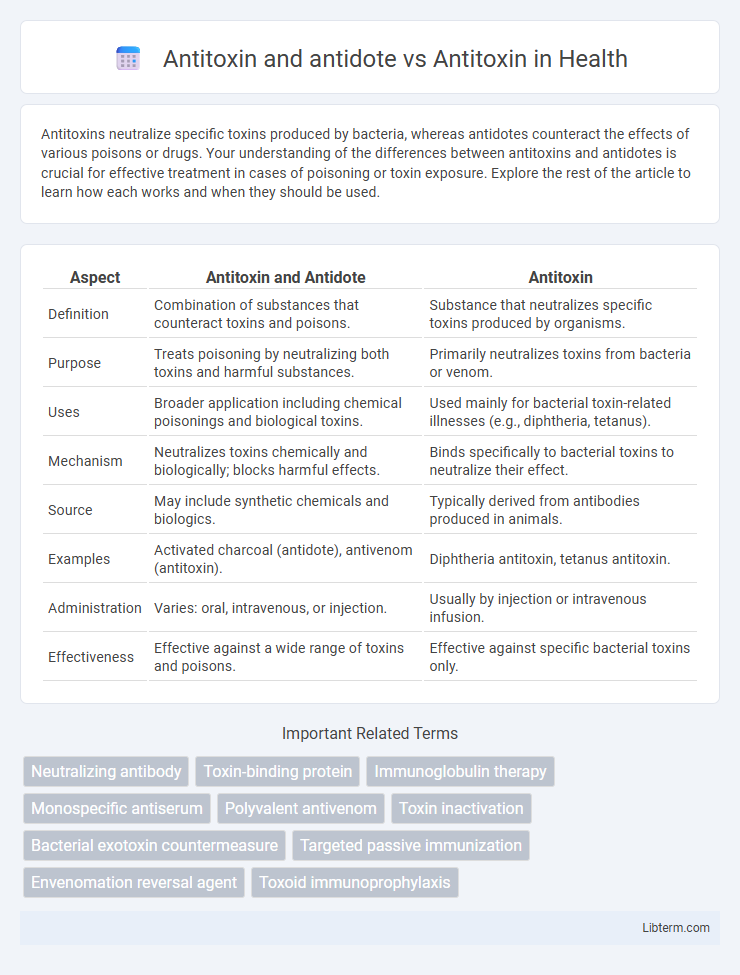Antitoxins neutralize specific toxins produced by bacteria, whereas antidotes counteract the effects of various poisons or drugs. Your understanding of the differences between antitoxins and antidotes is crucial for effective treatment in cases of poisoning or toxin exposure. Explore the rest of the article to learn how each works and when they should be used.
Table of Comparison
| Aspect | Antitoxin and Antidote | Antitoxin |
|---|---|---|
| Definition | Combination of substances that counteract toxins and poisons. | Substance that neutralizes specific toxins produced by organisms. |
| Purpose | Treats poisoning by neutralizing both toxins and harmful substances. | Primarily neutralizes toxins from bacteria or venom. |
| Uses | Broader application including chemical poisonings and biological toxins. | Used mainly for bacterial toxin-related illnesses (e.g., diphtheria, tetanus). |
| Mechanism | Neutralizes toxins chemically and biologically; blocks harmful effects. | Binds specifically to bacterial toxins to neutralize their effect. |
| Source | May include synthetic chemicals and biologics. | Typically derived from antibodies produced in animals. |
| Examples | Activated charcoal (antidote), antivenom (antitoxin). | Diphtheria antitoxin, tetanus antitoxin. |
| Administration | Varies: oral, intravenous, or injection. | Usually by injection or intravenous infusion. |
| Effectiveness | Effective against a wide range of toxins and poisons. | Effective against specific bacterial toxins only. |
Introduction to Antitoxins and Antidotes
Antitoxins and antidotes serve distinct roles in neutralizing toxins and poisons; antitoxins are antibody-based therapies targeting specific bacterial toxins, such as diphtheria or tetanus antitoxins used to prevent toxin-mediated damage. Antidotes counteract poisons by chemically neutralizing or blocking toxic effects, exemplified by naloxone used in opioid overdose or activated charcoal for certain ingestions. Understanding the mechanisms and applications of antitoxins versus antidotes is essential for effective clinical management of toxin-related conditions.
Defining Antitoxin: Mechanism and Uses
Antitoxin is a biological substance, often an antibody, that neutralizes specific toxins produced by bacteria, making it crucial in treating diseases such as diphtheria and tetanus. Unlike general antidotes that counteract poisons or chemicals through various mechanisms, antitoxins directly bind to and inactivate toxins, preventing their harmful effects on the body. Their primary use involves passive immunization, providing immediate, temporary protection or treatment against toxin-induced illnesses.
What is an Antidote? Key Characteristics
An antidote is a substance that counteracts the effects of a poison or toxin by neutralizing the harmful agent or blocking its action at the molecular level. Key characteristics of an antidote include specificity to a particular toxin, rapid onset of action, and the ability to prevent or reverse toxic symptoms effectively. Unlike antitoxins, which are antibodies targeting bacterial toxins, antidotes encompass a broader range of agents used in diverse poisoning scenarios.
Differences Between Antitoxins and Antidotes
Antitoxins are specific antibody preparations that neutralize toxins produced by bacteria, such as diphtheria or tetanus toxins, thereby preventing toxin-induced damage. Antidotes refer to a broader category of substances that counteract various poisons or overdoses, functioning through diverse mechanisms like chemical neutralization or receptor blockade. The key difference lies in specificity: antitoxins target biological toxins with immune-based neutralization, while antidotes address a wide range of toxic agents through multiple pharmacological actions.
How Antitoxins Work in Neutralizing Toxins
Antitoxins neutralize toxins by binding specifically to the toxin molecules, rendering them inactive and preventing them from interacting with target cells. Unlike general antidotes that counteract a broad range of poisons through various mechanisms, antitoxins target the toxin's unique molecular structure with high specificity. This targeted neutralization enables rapid and effective treatment of toxin-mediated diseases, such as diphtheria and tetanus.
Antitoxins vs. Antidotes: Clinical Applications
Antitoxins, derived from antibodies, specifically neutralize toxins produced by bacteria, making them essential in treating diseases like diphtheria and tetanus. Antidotes counteract the effects of chemical poisons or overdoses and work by mechanisms such as binding toxins or reversing biochemical effects. Clinically, antitoxins are primarily used in infectious toxin-mediated conditions, while antidotes address a broader range of toxic exposures, including drug overdoses and chemical poisonings.
Benefits and Limitations of Antitoxins
Antitoxins provide targeted neutralization of specific toxins, offering rapid symptom relief and reducing morbidity in toxin-mediated diseases like diphtheria and tetanus. Their benefits include high specificity and effectiveness in neutralizing circulating toxins before tissue damage occurs, but limitations involve a potential for allergic reactions, limited availability for rare toxins, and inability to reverse already established tissue injury. Unlike broad-spectrum antidotes, antitoxins require early administration and precise identification of the toxin to maximize therapeutic outcomes.
When to Use Antitoxin Over Antidote
Antitoxins are specifically designed to neutralize toxins produced by pathogens or poisonous substances, making them ideal for treating toxin-mediated diseases such as diphtheria or tetanus. Antidotes, however, counteract the harmful effects of chemicals or drugs by either blocking their action or enhancing their elimination. Choose antitoxin over antidote when the primary cause of illness is a bacterial toxin rather than a chemical overdose or poisoning, ensuring targeted neutralization and effective treatment.
Recent Advances in Antitoxin and Antidote Therapy
Recent advances in antitoxin and antidote therapy emphasize precision-targeted treatments for neutralizing specific toxins and reversing poisoning effects. Innovations in monoclonal antibodies and enzyme-based therapies have enhanced the efficacy and safety profiles of antitoxins, while novel small molecules and bioscavengers are expanding antidote applications against diverse chemical agents. These breakthroughs significantly improve clinical outcomes in toxin exposure cases by enabling faster, more effective neutralization and recovery processes.
Summary: Choosing Between Antitoxin and Antidote
Selecting between antitoxin and antidote depends on the nature of the toxin involved; antitoxins are specifically designed to neutralize bacterial toxins by targeting and binding to them, whereas antidotes are broader agents that counteract various poisons or chemical agents through different mechanisms. Antitoxins, such as diphtheria antitoxin, are passive immunizing agents containing antibodies that neutralize exotoxins, while antidotes like naloxone reverse opioid overdose by competing at receptor sites. Effective treatment requires accurate diagnosis of the toxin type to determine whether neutralizing antibodies (antitoxin) or pharmacologic reversal (antidote) is appropriate for patient recovery.
Antitoxin and antidote Infographic

 libterm.com
libterm.com